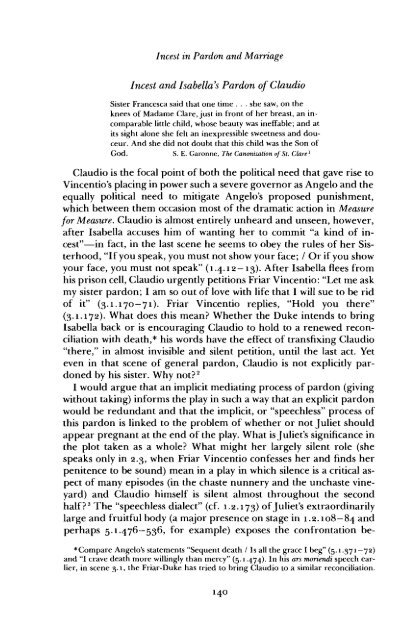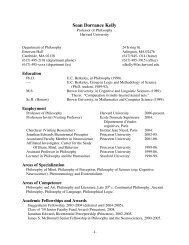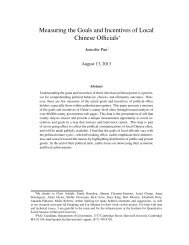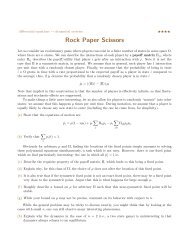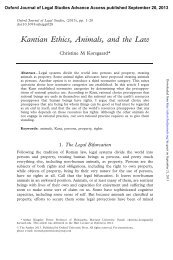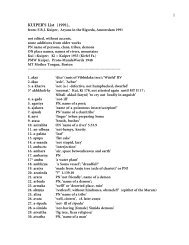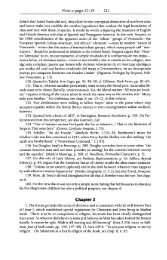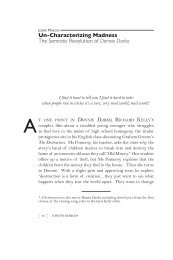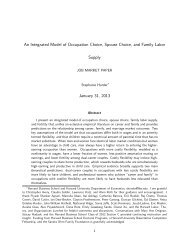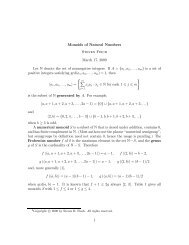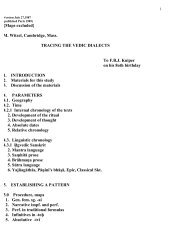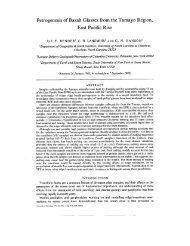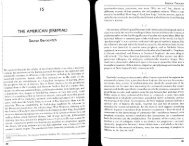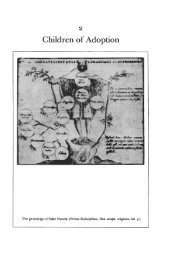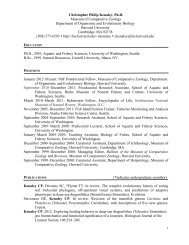Incest in Pardon and Marriage - People Fas Harvard
Incest in Pardon and Marriage - People Fas Harvard
Incest in Pardon and Marriage - People Fas Harvard
You also want an ePaper? Increase the reach of your titles
YUMPU automatically turns print PDFs into web optimized ePapers that Google loves.
<strong>Incest</strong> <strong>in</strong> <strong>Pardon</strong> <strong>and</strong> <strong>Marriage</strong><br />
<strong>Incest</strong> <strong>and</strong> Isabella's <strong>Pardon</strong> of Claudio<br />
Sister Francesca said that one time . . . she saw, on the<br />
knees of Madame Clare, just <strong>in</strong> front of her breast, an <strong>in</strong>-<br />
comparable little child, whose beauty was <strong>in</strong>effable; <strong>and</strong> at<br />
its sight alone she felt an <strong>in</strong>expressible sweetness <strong>and</strong> dou-<br />
ceur. And she did not doubt that this child was the Son of<br />
God. S. E. Garonne, The Canonization of St. Clare1<br />
Claudio is the focal po<strong>in</strong>t of both the political need that gave rise to<br />
V<strong>in</strong>centio's plac<strong>in</strong>g <strong>in</strong> power such a severe governor as Angelo <strong>and</strong> the<br />
equally political need to mitigate Angelo's proposed punishment,<br />
which between them occasion most of the dramatic action <strong>in</strong> Measure<br />
for Measure. Claudio is almost entirely unheard <strong>and</strong> unseen, however,<br />
after Isabella accuses him of want<strong>in</strong>g her to commit "a k<strong>in</strong>d of <strong>in</strong>-<br />
cest"-<strong>in</strong> fact, <strong>in</strong> the last scene he seems to obey the rules of her Sis-<br />
terhood, "If you speak, you must not show your face; / Or if you show<br />
your face, you must not speak" (1.4.12- 13). After Isabella flees from<br />
his prison cell, Claudio urgently petitions Friar V<strong>in</strong>centio: "Let me ask<br />
my sister pardon; I am so out of love with life that I will sue to be rid<br />
of it" (3.1.170- 7 1). Friar V<strong>in</strong>centio replies, "Hold you there"<br />
(3.1.172). What does this mean? Whether the Duke <strong>in</strong>tends to br<strong>in</strong>g<br />
Isabella back or is encourag<strong>in</strong>g Claudio to hold to a renewed recon-<br />
ciliation with death,* his words have the effect of transfix<strong>in</strong>g Claudio<br />
"there," <strong>in</strong> almost <strong>in</strong>visible <strong>and</strong> silent petition, until the last act. Yet<br />
even <strong>in</strong> that scene of general pardon, Claudio is not explicitly par-<br />
doned by his sister. Why not?2<br />
I would argue that an implicit mediat<strong>in</strong>g process of pardon (giv<strong>in</strong>g<br />
without tak<strong>in</strong>g) <strong>in</strong>forms the play <strong>in</strong> such a way that an explicit pardon<br />
would be redundant <strong>and</strong> that the implicit, or "speechless" process of<br />
this pardon is l<strong>in</strong>ked to the problem of whether or not Juliet should<br />
appear pregnant at the end of the play. What is Juliet's significance <strong>in</strong><br />
the plot taken as a whole? What might her largely silent role (she<br />
speaks only <strong>in</strong> 2.3, when Friar V<strong>in</strong>centio confesses her <strong>and</strong> f<strong>in</strong>ds her<br />
penitence to be sound) mean <strong>in</strong> a play <strong>in</strong> which silence is a critical as-<br />
pect of many episodes (<strong>in</strong> the chaste nunnery <strong>and</strong> the unchaste v<strong>in</strong>e-<br />
yard) <strong>and</strong> Claudio himself is silent almost throughout the second<br />
half? The "speechless dialect" (cf. 1.2.173) of Juliet's extraord<strong>in</strong>arily<br />
large <strong>and</strong> fruitful body (a major presence on stage <strong>in</strong> 1.2.108-84 <strong>and</strong><br />
perhaps 5.1.476-536, for example) exposes the confrontation be-<br />
*Compare Angelo's statements "Sequent death I 1s all the grace I beg" (5. I ,371 -72)<br />
<strong>and</strong> "I crave death more will<strong>in</strong>gly than mercy" (5. I ,474) 1n his ars moriendi speech ear-<br />
lier, <strong>in</strong> scene 3.1. the Friar-Duke has tried to br<strong>in</strong>g Claudio to a similar reconciliation.


